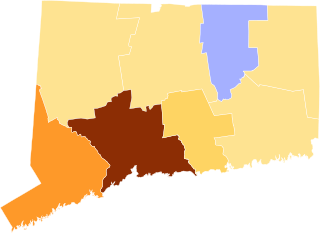
Presidential elections were held in the United States from November 2 to December 5, 1832. Incumbent president Andrew Jackson, candidate of the Democratic Party, defeated Henry Clay, candidate of the National Republican Party.

John Samuel Peters was an American politician, a member of the National Republican and later Whig parties, and the 26th Governor of Connecticut.

The 1828 New York gubernatorial election was held from November 3 to 5, 1828. Incumbent Governor DeWitt Clinton died in office on February 11, 1828. Lieutenant Governor Nathaniel Pitcher succeeded him but was not a candidate for election to the next term.

The 1830 New York gubernatorial election was held from November 1 to 3, 1830, to elect the Governor and Lieutenant Governor of New York. Incumbent governor Enos T. Throop was re-elected to a second term in office over Francis Granger.

The 1832 New York gubernatorial election was held from November 5 to 7, 1832, to elect the Governor and Lieutenant Governor of New York.

The 1832 United States presidential election in Pennsylvania took place between November 2 and December 5, 1832, as part of the 1832 United States presidential election. Voters chose 30 representatives, or electors to the electoral college, who voted for president and vice president.

The 1856 Connecticut gubernatorial election was held on April 7, 1856. Incumbent governor and American Party nominee William T. Minor defeated former congressman and Democratic nominee Samuel Ingham and former Comptroller of Connecticut and Republican nominee Gideon Welles with 38.99% of the vote.

The 1835 Connecticut gubernatorial election was held on April 6, 1835. It was a rematch of the 1834 Connecticut gubernatorial election. Former governor, senator and Democratic nominee Henry W. Edwards was elected, defeating incumbent governor and Whig nominee Samuel A. Foot with 52.13% of the vote.

The 1834 Connecticut gubernatorial election was held on April 7, 1834. Former senator and Whig nominee Samuel A. Foot was elected, defeating incumbent governor and Democratic nominee Henry W. Edwards with 49.83% of the vote.

The 1833 Connecticut gubernatorial election was held on April 1, 1833. Former senator and Democratic nominee Henry W. Edwards was elected, defeating incumbent governor and National Republican nominee John S. Peters with 41.31% of the vote.

The 1831 Connecticut gubernatorial election was held on April 8, 1831. Incumbent acting governor and National Republican nominee John S. Peters was elected to a term in his own right after the resignation of his predecessor Gideon Tomlinson, defeating Anti-Masonic nominee Zalmon Storrs with 68.75% of the vote.

The 2022 Vermont gubernatorial election was held on November 8, 2022, to elect the governor of Vermont. Incumbent Republican governor Phil Scott won re-election to a fourth term in a landslide, defeating Democratic nominee Brenda Siegel.

The 1892 Idaho gubernatorial election was held on November 8, 1892.

The 1830 Vermont gubernatorial election took place in September and October, and resulted in the election of Samuel C. Crafts to a one-year term as governor.

The 1832 Massachusetts gubernatorial election was held on November 12.

The second 1831 Massachusetts gubernatorial election was held on November 14.

The 1833–34 Massachusetts gubernatorial election consisted of a popular election held on November 11, 1833 and a legislative vote held in January 1834. The task of electing the governor fell to the Massachusetts General Court because no candidate received the constitutionally required majority of the popular vote.

The 1832 Ohio gubernatorial election was held on October 9, 1832.

The 1809 Connecticut gubernatorial election took place on April 10, 1809.

The 1832 Kentucky gubernatorial election was held on August 6, 1832.























